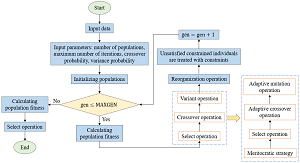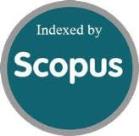Grid Operation and Inspection Resource Scheduling Based on an Adaptive Genetic Algorithm
DOI:
https://doi.org/10.46604/ijeti.2024.13129Keywords:
power grid operation inspection, bi-level programming, resource scheduling, adaptive genetic algorithm (AGA)Abstract
Grid operation and inspection a key links to ensure the safe operation of the power system, which requires efficient task allocation and resource scheduling. To address this problem, this paper proposes a resource scheduling model for grid operation and inspection based on bi-level programming. Firstly, the O&I process is analyzed and defined as a combined optimization problem of the multiple traveling salesman problem (MTSP) and the job-shop scheduling problem (JSP). Secondly, a bi-level programming model of MTSP and JSP is established according to the characteristics of the problem. Finally, an adaptive genetic algorithm is used to solve the problem. The feasibility of the model and the advancement of the algorithm are verified through the simulation of real scenarios and a large number of tests, which provide strong support for the sustainable development of the power system.
References
J. Yan, J. Huang, L. Zhou, C. Chen, Q. Wu, and J. Zhao, “Transmission Line Operation and Inspection Training Simulation Based on Multiple Time Scales and VR,” Journal of System Simulation, vol. 34, no. 2, pp. 212-220, 2022.
Y. Zhang, J. C. Guo, and J. D. Liao, “Construction and Research of Safety Management System for Machine Patrol Operation,” Mathematical Problems in Engineering, vol. 2021, article no. 4529169, 2021.
Z. Li, Y. Zhang, H. Wu, S. Suzuki, A. Namiki, and W. Wang, “Design and Application of a UAV Autonomous Inspection System for High-Voltage Power Transmission Lines,” Remote Sensing, vol. 15, no. 3, article no. 865, February 2023.
W. Wang, M. Lv, L. Ru, B. Lu, S. Hu, and X. Chang, “Multi-UAV Unbalanced Targets Coordinated Dynamic Task Allocation in Phases,” Aerospace, vol. 9, no. 9, article no. 491, September 2022.
O. Shorinwa, R. N. Haksar, P. Washington, and M. Schwager, “Distributed Multirobot Task Assignment via Consensus ADMM,” IEEE Transactions on Robotics, vol. 39, no. 3, pp. 1781-1800, June 2023.
J. Ru, D. Hao, X. Zhang, H. Xu, and Z. Jia, “Research on a Hybrid Neural Network Task Assignment Algorithm for Solving Multi-Constraint Heterogeneous Autonomous Underwater Robot Swarms,” Frontiers in Neurorobotics, vol. 16, article no. 1055056, January 2023.
F. Yucel and E. Bulut, “Online Stable Task Assignment in Opportunistic Mobile Crowdsensing with Uncertain Trajectories,” IEEE Internet of Things Journal, vol. 9, no. 11, pp. 9086-9101, June 2022.
Q. Zhang, Y. Wang, G. Yin, X. Tong, A. M. V. V. Sai, and Z. Cai, “Two-Stage Bilateral Online Priority Assignment in Spatio-Temporal Crowdsourcing,” IEEE Transactions on Services Computing, vol. 16, no. 3, pp. 2267-2282, May-June 2022.
M. A. Isah and B. S. Kim, “Integrating Schedule Risk Analysis with Multi-Skilled Resource Scheduling to Improve Resource-Constrained Project Scheduling Problems,” Applied Sciences, vol. 11, no. 2, article no. 650, January 2021.
K. Lin, J. Gao, G. Han, H. Wang, and C. Li, “Intelligent Blockchain-Enabled Adaptive Collaborative Resource Scheduling in Large-Scale Industrial Internet of Things,” IEEE Transactions on Industrial Informatics, vol. 18, no. 12, pp. 9196-9205, December 2022.
L. Zhu, J. Li, Z. Liu, and D. Zhang, “A Multi-Resource Scheduling Scheme of Kubernetes for IIoT,” Journal of Systems Engineering and Electronics, vol. 33, no. 3, pp. 683-692, June 2022.
Y. Wu, C. Guo, J. Zhao, X. Jin, and J. Xu, “RSKNet-MTSP: Effective and Portable Deep Architecture for Speaker Verification,” Neurocomputing, vol. 511, pp. 259-272, October 2022.
P. He and J. K. Hao, “Memetic Search for the Minmax Multiple Traveling Salesman Problem with Single and Multiple Depots,” European Journal of Operational Research, vol. 307, no. 3, pp. 1055-1070, June 2023.
Y. Li, J. Wang, and Z. Liu, “A Simple Two-Agent System for Multi-Objective Flexible Job-Shop Scheduling,” Journal of Combinatorial Optimization, vol. 43, no. 1, pp. 42-64, January 2022.
Y. Li, Z. Tao, L. Wang, B. Du, J. Guo, and S. Pang, “Digital Twin-Based Job Shop Anomaly Detection and Dynamic Scheduling,” Robotics and Computer-Integrated Manufacturing, vol. 79, article no. 102443, February 2023.
B. Shi, C. Xiao, K. Peng, L. Feng, J. Chen, and X. Zhang, “Two-Layer Joint Expansion Planning Strategy of Grid-Source-Storage for Distribution Network Based on Cluster Partition,” Automation of Electric Power Systems, vol. 47, no. 14, pp. 43-51, 2023. (In Chinese)
J. Zheng, Y. Hong, W. Xu, W. Li, and Y. Chen, “An Effective Iterated Two-Stage Heuristic Algorithm for the Multiple Traveling Salesmen Problem,” Computers & Operations Research, vol. 143, article no. 105772, July 2022.
Y. D. Wang, X. C. Lu, and J. R. Shen, “Improved Genetic Algorithm (VNS-GA) Using Polar Coordinate Classification for Workload Balanced Multiple Traveling Salesman Problem (mTSP),” Advances in Production Engineering & Management, vol. 16, no. 2, pp. 173-184, June 2021.
X. Long, J. Zhang, K. Zhou, and T. Jin, “Dynamic Self-Learning Artificial Bee Colony Optimization Algorithm for Flexible Job-Shop Scheduling Problem with Job Insertion,” Processes, vol. 10, no. 3, article no. 571, March 2022.
B. Liu, X. Yuan, and X. Ming, “A NovelMethod for Flexible Job Shop Scheduling Based on Genetic Algorithm and Variable Neighborhood Search,” Machine Design and Research, vol. 37, no. 1, pp. 177-182, 2021.
T. T. Ngoc, L. V. Dai, and L. B. Minh, “Effects of Data Standardization on Hyperparameter Optimization with the Grid Search Algorithm Based on Deep Learning: A Case Study of Electric Load Forecasting,” Advances in Technology Innovation, vol. 7, no. 4, pp. 258-269, October 2022.
B. Modi and M. Lalwani, “Power Sharing and Control by Droop Controller with Advanced Filter Design: A Case Study in Lock-Down Periods,” Proceedings of Engineering and Technology Innovation, vol. 18, pp. 49-60, April 2021.

Published
How to Cite
Issue
Section
License
Copyright (c) 2024 Bingnan Tang, Jing Bao, Nan Pan, Mingxian Liu, Jibiao Li, Zhenhua Xu

This work is licensed under a Creative Commons Attribution-NonCommercial 4.0 International License.
Copyright Notice
Submission of a manuscript implies: that the work described has not been published before that it is not under consideration for publication elsewhere; that if and when the manuscript is accepted for publication. Authors can retain copyright in their articles with no restrictions. Also, author can post the final, peer-reviewed manuscript version (postprint) to any repository or website.

Since Jan. 01, 2019, IJETI will publish new articles with Creative Commons Attribution Non-Commercial License, under Creative Commons Attribution Non-Commercial 4.0 International (CC BY-NC 4.0) License.
The Creative Commons Attribution Non-Commercial (CC-BY-NC) License permits use, distribution and reproduction in any medium, provided the original work is properly cited and is not used for commercial purposes.







.jpg)


